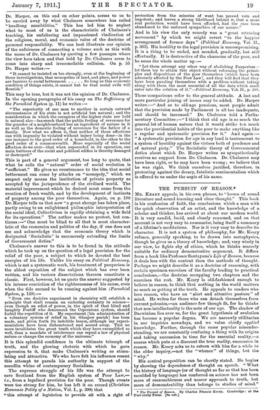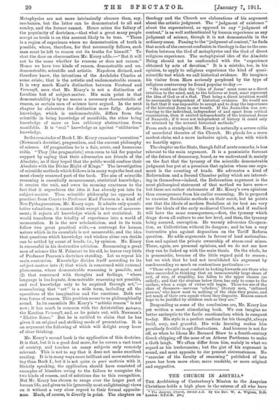THE PURSUIT OF REASON.*
Mn. KEA.BY appeals, in his own phrase, to "lovers of sound literature and sound learning and clear thought." This book is his confession of faith, the conclusions which a man with the quick observation of an artist, and the knowledge of a scholar and thinker, has arrived at about our modern world. It is very candid, lucid, and closely reasoned, and on that account is not very easy to summarise, being itself a summary of a lifetime's meditations. Nor is it very easy to describe its character. It is not a system of philosophy, for Mr. Keary refuses, generally speaking, to be drawn into metaphysics, though he gives us a theory of knowledge; and, very wisely in our view, he fights shy of ethics, which he thinks scarcely suitable for ordinary demonstrative argument. It differs from a book like Professor Santayana's Life of Reason, because it deals less with the content than the methods of thought. Perhaps we might describe it as a doctrine of reasoning, with certain specimen exercises of the faculty leading to practical conclusions,—the doctrine occupying two chapters and the exercises the rest. Mr. Keary is old-fashioned enough to believe in reason, to think that nothing in the world matters so much as getting at the truth. He appeals to readers who love reason, who have an "alert and attentive posture" of mind. He writes for those who can detach themselves from current polemics,—an audience few though fit, for he thinks that non-intellectuality is the note of our age. The shadow of Darwinism lies over us, for the great hypothesis of evolution has become a popular dogma. We are narrowly utilitarian in our inquiries nowadays, and we value chiefly applied knowledge. Further, through the same popular misunder- standing, we are constantly confusing a thing with its origins and taking succession in time for the essential reality,—a course which puts at a discount the true reality, succession in reason. Mr. Keary asks us to return with him for a while to the older inquiry,—not the "whence" of things, but the "why."
His central proposition can be shortly stated. He begins by showing the dependence of thought on speech. "What the history of language (or of thought so far as that has been moulded by language) has conferred on science has not been more of reasonableness and nearer approach to truth, but more of demonstrability than belongs to studies of mind."
• The Parsait of Reason. By Charles Francis Keary. Cambridge: at the University Press. [9s. net.]
Metaphysics are not more intrinsically obscure than, say, mechanics, but the latter can be demonstrated to all and sundry, and the former cannot. Hence arises the fallacy of the popularity of doctrines,—that what a great many people accept as truth is on this account likely to be true. "There is a region of experience where no demonstration of truth is possible, where, therefore, for that necessarily follows, each man must be left to reason out its truths for himself." To
shut the door on obscurantism Mr. Keary adds But it will not be the same whether he reasons or does not reason." Hence we have two kinds of reason, demonstrable and un- demonstrable, scientific and artistic. Napoleon divined, and therefore knew, the intentions of the Archduke Charles at some crisis; that is the artistic and undemonstrable reason. It is very much Kant's distinction between Verstand and Vernunft, save that Mr. Keary's is not a distinction of faculties but of subject-matter. His main point is that demonstrability is by no means a necessary characteristic of reason, as certain men of science have argued. In the next chapter he elaborates the distinction more fully. Artistic knowledge, which is undemonstrable, differs from the scientific in being knowledge of manifolds, the other being knowledge of more or less arbitrary abstractions from manifolds. It is "real" knowledge as against " utilitarian " knowledge.
In the remainder of Book I. Mr. Keary examines "assentism" (Newman's doctrine), pragmatism, and the current philosophy of science. Of pragmatism he is a fair, acute, and humorous critic. "They [the pragmatists] even seem to bid for popular support by saying that their adversaries are friends of the Absolute; as if they hoped that the public would confuse their Absolute with the Divine Right of Kings." The investigation of scientific methods which follows is in many ways the best and most closely reasoned part of the book. The aim of scientific reasoning is essentially measurement, statistical knowledge ; it creates the unit, and owes its seeming exactness to the fact that it reproduces the idea it has already put into its subject-matter. Thus scientific philosophy (as opposed to practice) from Comte to Professor Karl Pearson is a kind of Neo-Pythag,oreanism, Mr. Keary says. It admits only quanti- tative valuations ; it cannot think except in terms of measure- ment; it rejects all knowledge which is not statistical. It would transform the totality of experience into a world of mensuration. It is the new scholasticism, and in its train follow two great practical evils,—a contempt for human nature which in its essentials is not measurable, and the idea that questions which knowledge and wisdom alone can decide can be settled by count of heads, i.e., by opinion. Mr. Keary is successful in his destructive criticism. Summoning a great man of science like M. Poincar6 to his aid, he leaves very little of Professor Pearson's doctrines standing. Let us repeat his main contention. Knowledge divides itself according to its subject-matter into (1) that which is concerned with external phenomena, where demonstrable reasoning is possible, and (2) that concerned with thoughts and feelings, "where language is inadequate, demonstrable reasoning not possible, and real knowledge only to be acquired through art,"— remembering that " art " is a wide term, including all the operations of the imagination and the emotions. Both are true forms of reason. This position seems to us philosophically sound. In its essentials Mr. Keary's "artistic reason" is not new; it has much in common with the Aristotelian opbsols, the Kantian Vernunft, and, as he points out, with Newman's "Illative Sense." But he is entitled to claim that he has given it an original and striking mode of presentation. It is an argument the following of which will delight every lover of clear thinking.
Mr. Keary's second book is the application of this doctrine. It is that, but it is a good deal more, for he covers a vast tract of country, and touches on many subjects only remotely relevant. This is not to say that it does not make excellent reading. It is in many ways more brilliant and more entertain- ing than Book but it is not quite in par/ materia with it. Strictly speaking, the application should have consisted of examples of blunders owing to the failure to recognise the two kinds of reason, and of solutions due to this recognition. But Mr. Keary has chosen to range over the larger part of human life, and gives us his (generally most enlightening) views on it without a very close regard to their formal apposite- ness. Much, of course, is directly in point. The chapters on theology and the Church are elaborations of his argument about the artistic judgment. The "judgment of existence" about the supernatural, as opposed to any "judgment of content," is as well authenticated by human experience as any judgment of science, though it is not demonstrable in the
ordinary sense. Passing to the "judgment of content," be finds that much of the current confusion in theology is due to the con- fusion between the God of metaphysics and the God of direct religious experience. The metaphysical idea of the Absolute Being should not be confounded with the "experience obtained by acts of devotion." It is a mistake, too, in his opinion, to apply to religious experience the kind of quasi- scientific test which we call historical evidence. He imagines his visitor from Mars seriously perplexed by the type of religious controversy be found popular to-day :—
"He would see that the 'idea of Jesus' must come as a direct intuition to the mind, and, to the believer at least, must represent the idea of God or of a God. That being a direct intuition would be necessarily independent of historical evidence. He would see in fact that it was impossible to accept and to deny the importance of the historical Jesus in one breath. If the Jesus-idea was con- vincing to the individual, independent of and apart from critical examination, then it existed independently of the historical Jesus of Nazareth ; if it were not independent of history it could only be attained by the natural historical methods."
From such a standpoint Mr. Keary is naturally a severe critic of sacerdotal theories of the Church. He pleads for a more modest claim and a more inclusive spirit, a plea with which we heartily agree.
The chapter on the State, though full of acute remarks, is less relevant to the main argument. It is a pessimistic forecast of the future of democracy, based, as we understand it, mainly on the fact that the tyranny of the scientific demonstrable judgment has put at a premium that opinion whose one argu- ment is the counting of heads. He advocates a kind of Referendum and a Second Chamber policy which are interest- ing in themselves—indeed, the Referendum argument is the most philosopical statement of that method we have seen— but these are rather statements of Mr. Keary's own opinions than consequences from his earlier reasoning. He is prepared to examine Socialistic methods on their merit, but he points out that the ideals of modern Socialism at its best are very near the ideals of the early mediaeval Church, and if realised will have the same oonsequences,—first, the tyranny which drags down all culture to one low level, and then, the tyranny being assured, corruption. He warmly advocates Co-opera- tion, as Collectivism without its dangers ; and he has a very instructive plea against dogmatism on the Tariff Reform question. He adds arguments in favour of land nationalisa- tion and against the private ownership of steam-coal mines. These, again, are personal opinions, and we do not see how they can be linked up with the main thesis. On the whole, he is pessimistic, because of the little regard paid to reason ; but we wish that he had not invalidated his argument by condescending so much on contentious particulars :—
"Those who get most comfort in looking forwards are those who have succeeded in thinking that an immeasurably large share of evil, of vice, of stupidity, has fallen to the upper classes (so called) ; and that the stratum below them has only to come to the surface, when a reign of virtue will begin. These too are of the class of dreamers—nervous scholars,' literary men, cultured persons,' who know next to nothing of the class they praise, and not much of their own equals whom they dispraise. Reason cannot hope to be justified by children such as they are."
Desponding as some of the conclusions are, Mr. Keary has yet written a most stimulating book. We can imagine no better antiseptic to the facile emotionalism which is rampant to-day. His style is a perfect medium for his thought, always lucid, easy, and graceful. His wide learning makes him peculiarly fruitful in apt illustrations. And humour is not far off, as when he likens Mr. Bernard Shaw to a fourth-century Greek chipping off the nose of an Athene Parthenos to make a Goth laugh. We often differ from him, mainly in what we regard as his irrelevancies ; but the gist of his argument is sound, and most apposite to



















































 Previous page
Previous page